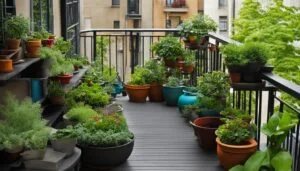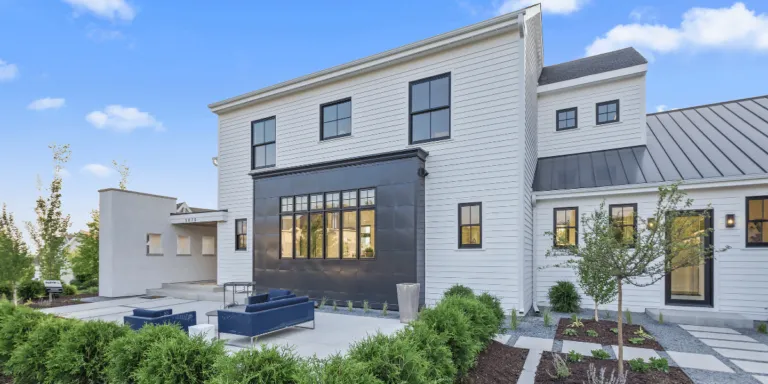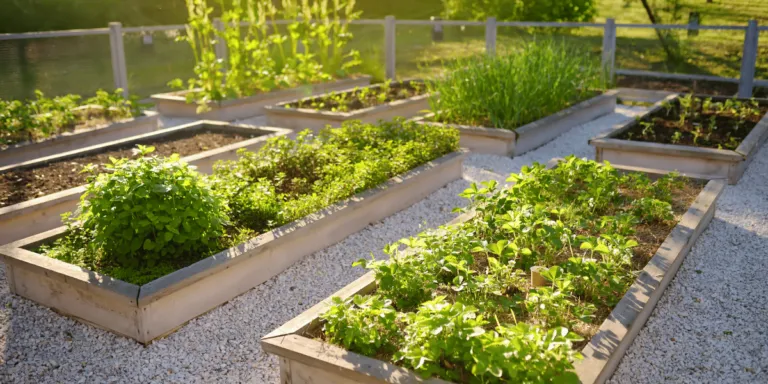Container gardening is a space-efficient and mobile gardening method that allows plants to be grown in containers such as pots, making it an ideal solution for urban areas. Whether you have a small balcony, rooftop, or courtyard, container gardening offers a way to bring greenery and nature into your urban environment.
Sustainable Urban Gardening is at the forefront of this gardening trend, as it promotes environmentally friendly practices such as recycling and reusing containers, using organic soil, and employing innovative water conservation techniques. By utilizing renewable energy in eco-gardens, urban dwellers can reduce their carbon footprint and create a greener, more sustainable future.
Key Takeaways:
- Container gardening is a space-efficient and mobile gardening method, perfect for urban environments.
- Sustainable Urban Gardening promotes eco-friendly practices and innovative water conservation techniques.
- By utilizing renewable energy in eco-gardens, urban dwellers can reduce their carbon footprint.
- Container gardening allows urban dwellers to bring nature into their limited spaces.
- Container gardening offers opportunities for creativity and design in eco-friendly landscape projects.
Plants for Container Gardening in Urban Areas
Container gardening in urban areas offers a wide range of plant options. Many plants produce berries and flowers that attract birds, providing a habitat for wildlife in urban spaces. Additionally, container gardening allows for the implementation of high-tech smart gardening practices, space-efficient vertical gardening, and urban permaculture practices. For those with limited outdoor space, indoor hydroponic systems can be used to grow plants in nutrient-rich water. Organic composting methods can also be employed to enrich the soil in containers.
If you’re looking to create a wildlife habitat garden, container gardening provides an opportunity to attract birds and other wildlife to your urban space. Consider planting flowering plants that produce berries or nectar, as they are known to attract various bird species. Some popular options include:
- Rubus (blackberry, raspberry): These plants produce delicious berries for both birds and humans to enjoy.
- Sambucus (elderberry): Known for its dark purple berries, elderberry is a favorite among many bird species.
- Fuchsia: These vibrant flowering plants produce nectar that attracts hummingbirds.
- Cornus (dogwood): Dogwood trees offer both shelter and food for birds, with their colorful berries.
Container gardening also provides an opportunity to explore high-tech smart gardening practices. Consider incorporating smart sensors that monitor moisture levels, temperature, and light intensity to ensure optimal growing conditions for your plants. Vertical gardening is another space-efficient technique that allows you to maximize the use of limited space by growing plants vertically on walls or trellises.
Urban permaculture practices can also be implemented in container gardening. Permaculture focuses on creating sustainable and self-sufficient systems that mimic natural ecosystems. Incorporate companion planting and nutrient cycling techniques to create a balanced and resilient container garden.
For those with limited outdoor space, indoor hydroponic systems offer a solution for growing plants indoors. Hydroponics involves growing plants in nutrient-rich water, without the use of soil. This method allows for year-round gardening and precise control over nutrient levels and environmental conditions.
Finally, organic composting methods can be employed to enrich the soil in containers. Composting kitchen scraps and garden waste not only helps reduce waste going to landfills but also provides a nutrient-rich soil amendment for your container plants. Consider using a worm composting system or a small compost bin to create your own organic compost.
Create a Wildlife Habitat Garden in Your Urban Space
In order to attract birds and other wildlife to your container garden, it’s important to provide the necessary elements for a wildlife habitat. This includes:
- Food sources: Choose plants that produce berries, fruits, or nectar to provide food for birds.
- Water sources: Include a bird bath or small water feature in your container garden to provide water for thirsty birds.
- Shelter: Use a mix of tall and short plants to create different levels of shelter and nesting spaces for birds.
- Native plants: Select native plant species that are adapted to your local climate and provide the best habitat for local wildlife.
By incorporating these elements into your container garden, you can create a wildlife habitat that attracts a variety of birds and other beneficial creatures to your urban space.
Choosing Containers for Urban Container Gardening

When it comes to urban container gardening, the possibilities for container choices are limitless. Any container that can hold soil can be used, giving you the flexibility to get creative with your gardening setup. Not only does this allow you to repurpose items found at home or in the community, but it also reduces waste and promotes eco-friendliness.
If you’re interested in taking your urban garden to new heights, there are specialized containers available for incorporating green roof ecosystems. These containers are designed to support the growth of vegetation on rooftops, creating a vibrant and sustainable urban oasis.
Container gardening also provides a unique opportunity to showcase contemporary garden artistry. By selecting containers that are aesthetically pleasing and complementary to your overall garden design, you can create a visually stunning outdoor space that showcases your personal style and flair.
Furthermore, container gardening lends itself well to the integration of biophilic design principles. Biophilic design focuses on incorporating natural elements into built environments, promoting a sense of connection with nature. By strategically placing containers filled with lush plants and greenery, you can create a calming and inviting atmosphere that brings the outdoors closer to your urban dwellings.
Take a look at the image below to see how containers can be creatively used to enhance the beauty and functionality of an urban garden:
Aesthetically Pleasing and Functional Containers for Urban Container Gardening
| Container Type | Description |
|---|---|
| Terra Cotta Pots | Classic and timeless, these pots can add a touch of rustic charm to your urban garden. They are durable and allow for good airflow, promoting healthy plant growth. |
| Hanging Baskets | Perfect for maximizing vertical space, hanging baskets are an excellent choice for trailing plants. Hang them from balconies or fences to create a lush green display. |
| Window Boxes | Designed to be affixed to windowsills, these containers are ideal for growing herbs and small flowering plants. Enjoy fresh culinary delights right at your fingertips. |
| Recycled Containers | Give old buckets, bins, or barrels a new lease on life by repurposing them as containers for your urban garden. Get creative and let your imagination run wild! |
Choose containers that align with your personal style and gardening goals. Remember, the key is to create functional and beautiful spaces that contribute to a thriving urban ecosystem.
Tips for Successful Urban Container Gardening

When it comes to successful urban container gardening, there are a few key tips to keep in mind. By following these guidelines, you can ensure that your container garden thrives in your urban environment.
Choose Plants Suited for Your Urban Environment
One of the first steps in successful container gardening is selecting plants that are well-suited to your specific urban environment. Consider the amount of sunlight your containers will receive and choose plants accordingly. For example, if your balcony or rooftop garden is mostly shaded, opt for shade-loving plants such as ferns, hostas, or impatiens. On the other hand, if your containers receive ample sunlight, choose sun-loving plants like marigolds, lavender, or tomatoes.
Incorporate Smart Garden Automation
To simplify the maintenance of your container garden, consider incorporating smart garden automation. This technology allows you to automate watering and irrigation schedules, ensuring that your plants receive the proper care and hydration. Smart garden automation systems can be programmed to deliver water at specific intervals, based on the needs of your plants. By utilizing this technology, you can avoid overwatering or underwatering your containers, leading to healthier and more vibrant growth.
Implement Eco-Friendly Garden Renovation Methods
To reduce the environmental impact of your urban container garden, consider implementing eco-friendly garden renovation methods. Start by sourcing sustainable and organic soil mixes or compost to fill your containers. Additionally, opt for containers made from recycled materials or repurpose items such as old buckets or crates. By choosing sustainable materials, you can reduce waste and contribute to a more eco-friendly garden space.
Overall, by choosing plants suitable for your urban environment, incorporating smart garden automation, and implementing eco-friendly garden renovation methods, you can ensure the success and sustainability of your urban container garden.
The Benefits of Container Gardening in Urban Areas
Container gardening in urban areas offers numerous benefits. It allows individuals to engage in sustainable urban gardening practices, promoting the growth of fresh produce in limited spaces. Furthermore, it contributes to eco-friendly landscape design by utilizing recycled materials and reducing waste. Container gardens also provide a habitat for wildlife, particularly in the form of wildlife habitat gardens, attracting birds and other beneficial creatures to urban areas.
Container gardening is not only a practical solution for urban dwellers but also an opportunity to adopt environmentally conscious gardening practices. By making use of containers, urban gardeners can grow a variety of plants in small spaces, contributing to sustainable urban gardening.
In addition to promoting sustainability, container gardening also plays a role in eco-friendly landscape design. By repurposing materials and reducing waste, container gardens support the principles of eco-consciousness.
One of the key advantages of container gardening in urban areas is its ability to create wildlife habitat gardens. By incorporating plants that attract birds and insects, container gardens provide a valuable habitat for urban wildlife. This not only enhances biodiversity but also creates a harmonious coexistence between humans and nature in the midst of concrete jungles.
Overall, container gardening in urban areas offers a multitude of benefits, ranging from sustainable urban gardening practices and eco-friendly landscape design to the creation of wildlife habitat gardens. It is a versatile and accessible way for individuals to connect with nature, reduce their environmental impact, and contribute to a healthier and more vibrant urban environment.
Education and Community Involvement in Urban Container Gardening
Urban container gardening is not just about growing plants; it is also an opportunity for education and community involvement. Schools and community organizations can incorporate container gardening into their curriculum or activities to teach sustainable urban gardening practices and eco-friendly landscape design. By getting hands-on experience in gardening, individuals can develop a sense of environmental stewardship and learn valuable skills that can be applied to their everyday lives.
One inspiring initiative is the CityAdapt project in partnership with the Jamaica 4-H Clubs. This project has piloted various climate-smart interventions in city schools, including hydroponics, rainwater harvesting, and greenhouses. These activities equip students with first-hand knowledge of practices that help them respond to the realities of a changing climate in smaller, densely populated city spaces. Through container gardening, students can gain a deeper understanding of sustainable urban gardening and become advocates for eco-friendly practices.
In addition to educational institutions, community gardens and shared container gardening spaces also promote social interaction and collaboration. These spaces provide opportunities for urban residents to come together, share knowledge, and work towards a common goal of creating a greener and more sustainable urban environment. By engaging in community gardening, individuals can connect with their neighbors, foster a sense of unity, and create a stronger sense of belonging in their community.
Benefits of Education and Community Involvement in Urban Container Gardening
The benefits of education and community involvement in urban container gardening extend beyond just the individuals involved. By teaching sustainable urban gardening practices and eco-friendly landscape design, we can create a ripple effect that impacts the entire community. Some of the key benefits include:
- Increased awareness of sustainable practices: Education and community involvement in urban container gardening help spread awareness about the importance of sustainable urban gardening and eco-friendly landscape design. This can lead to a wider adoption of these practices and create a positive impact on the environment.
- Improved food security: By teaching individuals how to grow their own food in limited spaces, container gardening can contribute to improved food security in urban areas. It empowers individuals to have greater control over their food production and reduces dependence on external food sources.
- Enhanced well-being and mental health: Connecting with nature and working together in community gardens has been shown to have a positive impact on mental health and well-being. It provides a peaceful and calming environment, encourages physical activity, and offers a sense of purpose and accomplishment.
| Community Initiative | Description | Impact |
|---|---|---|
| “City Green Up” | A community-led project where residents transform unused urban spaces into vibrant container gardens. | Improved aesthetics of the neighborhood and increased sense of community pride. |
| “Garden-to-School Program” | Collaboration between local schools and community organizations to introduce students to container gardening and healthy eating. | Improved nutrition among students and increased knowledge of sustainable practices. |
| “Urban Garden Alliance” | An alliance of urban container gardeners who share resources, knowledge, and experiences to support each other. | Enhanced community resilience, knowledge exchange, and promotion of sustainable gardening practices. |
Challenges and Solutions in Urban Container Gardening
While urban container gardening offers many benefits, it is important to be aware of the challenges that can arise in this unique environment. Limited space, lack of sunlight, and potential pests are common obstacles that urban gardeners may face. However, with careful planning and the right techniques, these challenges can be overcome. Let’s explore some solutions to ensure the success of your urban container garden.
Challenge 1: Limited Space
One of the main challenges in urban container gardening is the limited available space. However, there are space-efficient vertical gardening techniques that can maximize the use of your small area. By utilizing vertical planters, hanging baskets, or trellises, you can grow a variety of plants while saving precious space. This not only expands your gardening possibilities but also adds an aesthetic element to your urban environment.
Challenge 2: Lack of Sunlight
Another common challenge in urban areas is the limited sunlight exposure due to tall buildings or shaded balconies. However, high-tech smart gardening tools can help monitor and control sunlight exposure, temperature, and irrigation to ensure your plants receive the optimal growing conditions. Automated systems can be set up to adjust artificial lighting and provide supplemental sunlight for your plants, ensuring they thrive even in the absence of direct sunlight.
Challenge 3: Potential Pests
Pests can be a concern in urban container gardens, as they can quickly damage or destroy your precious plants. However, it is possible to implement organic and eco-friendly pest control methods to protect your plants without the use of harmful chemicals. Companion planting, such as interplanting pest-repellent herbs or flowers with your vegetables, can help deter pests naturally. Additionally, regular inspection of plants and early intervention can prevent pest infestations from spreading.
By utilizing these solutions, you can overcome the challenges of limited space, lack of sunlight, and potential pests in your urban container garden. With careful planning and the right techniques, sustainable urban gardening practices and high-tech smart gardening can coexist harmoniously, allowing you to enjoy the beauty and benefits of a thriving garden in your urban environment.
Conclusion
Container gardening in urban environments offers a sustainable and eco-friendly solution for individuals looking to create thriving gardens in limited spaces. With container gardening, you have the flexibility to grow a variety of plants that not only beautify your urban environment but also attract and benefit birds and wildlife.
By incorporating innovative techniques like smart gardening automation and design principles such as biophilic design, urban container gardens can be transformed into efficient and visually appealing green spaces. These gardens not only provide a source of fresh produce but also contribute to the overall well-being of the environment.
Education and community involvement play a crucial role in spreading awareness and promoting sustainable urban gardening practices. By engaging schools and community organizations, container gardening can be integrated into curriculums and activities, providing hands-on experience and fostering a sense of environmental stewardship.
Despite the challenges, such as limited space and potential pests, container gardening in urban areas offers a way for individuals to connect with nature, reduce environmental impact, and contribute to a healthier and more vibrant urban environment. So, start your eco-friendly garden renovation journey today and enjoy the benefits of sustainable urban gardening through container gardening.
Frequently Asked Questions
What is container gardening?
Container gardening is a method of growing plants in containers like pots rather than in the ground.
Why is container gardening suitable for urban areas?
Container gardening is space-efficient and mobile, making it ideal for limited urban spaces.
What are the benefits of container gardening in urban areas?
Container gardening promotes sustainable urban gardening practices, eco-friendly landscape design, and the implementation of innovative water conservation techniques and renewable energy in eco-gardens. It also provides a habitat for urban birds and other wildlife.
What plants are suitable for container gardening in urban areas?
Many types of plants can be grown in urban areas, including ones that produce berries and flowers that attract birds. High-tech smart gardening, space-efficient vertical gardening, and urban permaculture practices can also be incorporated.
Can I reuse old containers for urban container gardening?
Yes, any containers that can hold soil can be used for container gardening, including old ones found at home or in the community. It is an environmentally friendly option that reduces waste.
How can I incorporate green roof ecosystems and contemporary garden artistry into my urban container garden?
Specialized containers for green roofs can be used to create green roof ecosystems. Contemporary garden artistry can be achieved through the use of biophilic design principles, creating visually appealing and environmentally conscious spaces.
What tips can you provide for successful urban container gardening?
It is essential to choose plants appropriate for the available sunlight and growing conditions in your urban environment. Incorporating smart garden automation can simplify maintenance, while eco-friendly garden renovation methods can improve sustainability.
What are the benefits of container gardening in urban areas?
Container gardening allows for sustainable urban gardening, eco-friendly landscape design, and the creation of wildlife habitat gardens that attract birds and other beneficial creatures to urban areas.
How can education and community involvement be incorporated into urban container gardening?
Schools and community organizations can use container gardening as a part of their curriculum or activities to teach sustainable practices and eco-friendly landscape design. Community gardens and shared container gardening spaces promote social interaction and collaboration.
What are the challenges and solutions in urban container gardening?
Limited space, lack of sunlight, and potential pests are common challenges in urban environments. Solutions include space-efficient vertical gardening, high-tech smart gardening tools, and organic pest control methods.
In conclusion, what are the benefits of container gardening in urban areas?
Container gardening offers a sustainable and eco-friendly solution for individuals to create thriving gardens in limited urban spaces. It promotes sustainable practices, connects individuals with nature, and contributes to a healthier and more vibrant urban environment.










